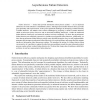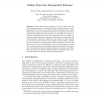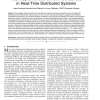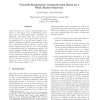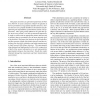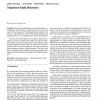124
click to vote
PODC
2012
ACM
13 years 4 months ago
2012
ACM
Failure detectors — oracles that provide information about process crashes — are an important ion for crash tolerance in distributed systems. Although current failure-detector...
129
click to vote
OPODIS
2010
14 years 12 months ago
2010
Failure detectors are commonly viewed as abstractions for the synchronism present in distributed system models. However, investigations into the exact amount of synchronism encapsu...
142
click to vote
TC
2002
15 years 1 months ago
2002
We investigate whether asynchronous computational models and asynchronous algorithms can be considered for designing real-time distributed fault-tolerant systems. A priori, the lac...
117
click to vote
JSA
2008
15 years 2 months ago
2008
Nowadays, there are many protocols able to cope with process crashes, but, unfortunately, a process crash represents only a particular faulty behavior. Handling tougher failures (...
FTCS
1993
15 years 3 months ago
1993
Failure detectors (or, more accurately Failure Suspectors { FS) appear to be a fundamental service upon which to build fault-tolerant, distributed applications. This paper shows t...
120
click to vote
OPODIS
2008
15 years 3 months ago
2008
This paper presents an asynchronous implementation of a failure detector for unknown and mobile networks. Our approach does not rely on timers. Neither the composition nor the numb...
129
click to vote
DSN
2005
IEEE
15 years 4 months ago
2005
IEEE
This paper describes an experiment performed on Wide Area Network to assess and fairly compare the Quality of Service provided by a large family of failure detectors. Failure dete...
111
click to vote
WDAG
1998
Springer
15 years 6 months ago
1998
Springer
We present fault detectors for transient faults, (i.e. corruptions of the memory of the processors, but not of the code of the processors). We distinguish fault detectors for tasks...
117
click to vote
SRDS
2000
IEEE
15 years 6 months ago
2000
IEEE
The concept of unreliable failure detector was introduced by Chandra and Toueg [2] as a mechanism that provides information about process failures. Depending on the properties the...
CONCUR
2003
Springer
15 years 7 months ago
2003
Springer
Abstract. We give a process calculus model that formalizes a wellknown algorithm (introduced by Chandra and Toueg) solving consensus in the presence of a particular class of failur...
